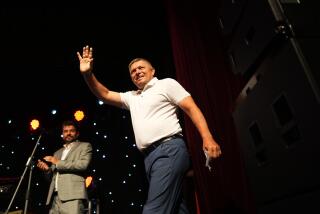New Czech Party Bars Communist Defectors : East Bloc: Steering a course between the old regime and its foes proves difficult as the Agricultural Party readies for the June vote.
- Share via
ZADVERICE, Czechoslovakia — A potentially powerful but controversial new political party, described by opponents as a front for the old regime, temporarily banned recent Communist Party defectors from its leading ranks at a sometimes stormy founding congress here Saturday.
But the Czechoslovak Agricultural Party’s newly elected top leaders left open the possibility of future cooperation with Communists or any other groups with which it might find common cause as the country heads for its first free national elections in more than 40 years next June 8.
Founders of the new party, one of more than 30 that have sprung up in Czechoslovakia after the country’s so-called velvet revolution late last year, appeared eager to steer a political course between the Communists and Civic Forum, the latter a democratic movement whose mass demonstrations ultimately brought down the former regime.
But the extent to which the Communist issue dominated discussions here in the south Moravian countryside suggests that such a middle course may prove impossible during what promises to be a bare-knuckled election campaign.
Civic Forum has singled out the Agricultural Party for criticism and suggested, based on circumstantial evidence, that it is a haven for former Communist loyalists trying to preserve their influence.
The first public call for formation of the party came at an early December congress of the Union of Cooperative Farmers, a Communist-dominated body.
The initial version of the new party’s proposed program pledged fealty to a socialist political path and also invited disenchanted Communist Party members to join.
Then, in a serious blow to the new group’s credibility, the Communist Party’s chairman, Ladislav Adamec, publicly named what was then still a prospective Agricultural Party as a possible partner with the Communists in a future government coalition.
If the party indeed is a Communist front, there was little evidence of that here Saturday. Most of the delegates were not top cooperative farm managers, but middle- and low-level technocrats and ordinary laborers, some of whom said in interviews that they had never before belonged to a political party.
The Agricultural Party’s slogan, displayed on a banner over the stage where party leaders sat in a hall owned by one of the country’s most prosperous cooperatives, proclaims: “Free Democratic Development of the Countryside.”
Nevertheless, Civic Forum’s criticisms inspired a grass-roots drive to revise the party’s program, drawing a line between it and the discredited Communists.
Delegates voted to insert a new section into a party program that had already been drafted three times. The latest amendment expressed the party’s desire to “further develop” Civic Forum’s program “for the needs of the countryside” and disassociated it from policies of a Communist Party “which brought the society to a totalitarian regime.”
The amendment also pledged to “prevent by all democratic means that the Czechoslovak Agricultural Party become even a temporary asylum for the compromised members of the Communist Party.”
Civic Forum observer Miroslav Tyl, who addressed the delegates, welcomed the changes and made it clear his movement is eager to patch up relations.
“It looks like the party has taken a better direction than it took originally,” he said later in an interview. However, he said, Civic Forum remains less than fully persuaded of the new party’s democratic commitment.
Pressed at a news conference, newly elected party chairman Frantisek Trinka said that while it is premature to talk about coalitions, “we do not reject cooperation for a good cause with anybody.”
He condemned “the compromised people from the Communist Party,” but added that it is his “profound conviction (that) there were in the Communist Party a number of honest workers. . . . Should we say ‘Enough? We don’t want these people?’ That would be . . . unjust, and we would find ourselves in the same position in which the Communist Party in Moscow wound up.”
Trinka, an economist, was expelled from the Communist Party in purges that followed the Soviet-led Warsaw Pact invasion, which put an end to the so-called Prague Spring reforms of 1968.
Analysts say the Agricultural Party could become one of the strongest in Czechoslovakia, drawing on a rich rural tradition, the country’s 2 million farmers and possibly attracting a following also among its 4 million pensioners.
More to Read
Sign up for Essential California
The most important California stories and recommendations in your inbox every morning.
You may occasionally receive promotional content from the Los Angeles Times.













